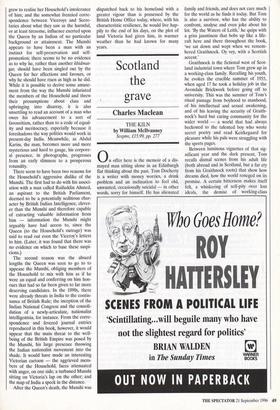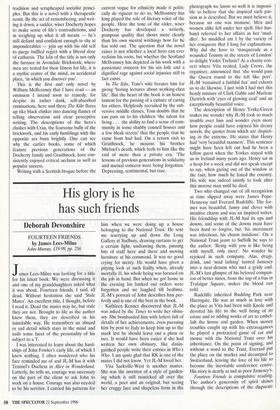Scotland the grave
Charles Maclean
THE KILN by William Mcllvanney Sceptre, £15.99, pp. 277 n offer here is the memoir of a dis- mayed man sitting alone in an Edinburgh flat thinking about the past. Tom Docherty is a writer with money worries, a drink problem and an inclination to feel old, unwanted, occasionally suicidal — in other words, sorry for himself. He has alienated family and friends, and does not care much for the world as he finds it today. But Tom is also a survivor, who has the ability to confront, analyse and even joke about his lot. 'By the Waters of Leith,' he quips with a grim jauntiness that bobs up like a life- raft here and there throughout the book, 'we sat down and wept when we remem- bered Graithnock. Oy vey, with a Scottish accent.'
Graithnock is the fictional west of Scot- land industrial town where Tom grew up in a working-class family. Recalling his youth, he evokes the crucible summer of 1955, when aged 17 he took a holiday job in the Avondale Brickwork before going off to university. This was the summer of Tom's ritual passage from boyhood to manhood, of his intellectual' and sexual awakening, and of his leaving the security of Graith- nock's hard but caring community for the wider world — a world that had always beckoned to the talented boy who wrote secret poetry and read Keirkegaard for pleasure while his pals were struggling with the sports pages.
Between luminous vignettes of that sig- nificant year and the dark present, Tom recalls dismal scenes from his adult life (both abroad and in Scotland, but a far cry from his Graithnock roots) that show how dreams died, how the world reneged on its promise. A certain bitterness makes itself felt, a whiskering of self-pity over los ideals, the demise of working-class tradition and scrapheaped socialist princi- ples. But this is a novel with a therapeutic remit. By the act of remembering, and writ- ing it down, a sadder, wiser Docherty hopes to make sense of life's contradictions, and in weighing up what it all means — he's still defiant and confident enough to shy at imponderables — join up with his old self to purge baffled regret with a liberal dose of catharsis. The kiln of the title is not only the furnace in Avondale Brickwork, where men are tested for their fitness for life, it is a mythic centre of the mind, an accidental place, 'in which you discover you'.
This is the first and only novel by William Mcllvanney that I have read — an omission I intend soon to remedy, for despite its rather dank, self-absorbed ruminations, here and there The Kiln flares up like black clinker into dancing flames of telling observation and clear perceptive writing. The descriptions of the hero's clashes with Cran, the fearsome bully of the brickwork, and his early fumblings with the opposite sex burn brightly. One can see why the earlier books, some of which feature previous generations of the Docherty family and Graithnock, have con- sistently enjoyed critical acclaim as well as popular success.
Writing with a Scottish brogue before the current vogue for ethnicity made it politi- cally de rigueur to do so, Mcllvanney has long played the role of literary voice of the people. Here the tone of the older, wiser Docherty has developed a writerly, pompous quality that shows more clearly than his own mental writhings how far he has sold out. The question that the novel raises is not whether a local hero can ever reclaim his roots, but whether the Scotland Mcllvanney has depicted in his work with a passionate concern for his ain folk and a dignified rage against social injustice still in fact exists.
In The Kiln, Tom's wife berates him for giving 'boring lectures about working-class life'. But the heart of the book is an honest lament for the passing of a culture of caring for others. Helplessly recruited by the sub- versive middle classes, Tom doubts that he can pass on to his children 'the talent for living ... the ability to find a sense of com- munity in some shabby council houses and a few bleak streets' that the people that he came from had had. On a return visit to Graithnock, he mourns his brother Michael's death, which feels to him like the end of more than a private era. 'The lessons of previous generations in solidarity and mutual concern were being forgotten.' Depressing, sentimental, but true.



















































































 Previous page
Previous page